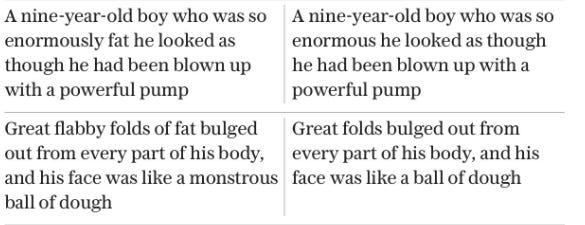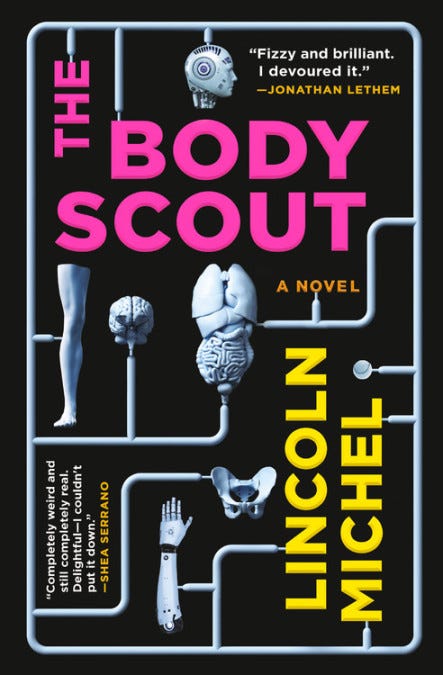The Roald Dahl Edits Aren't About Anything Except Corporate Profits
Bowdlerizing his books is more IP shilling than "threat to free speech"
Let’s get this out of the way: Roald Dahl was kind of a piece of shit. Anti-Semitic, fatphobic, and plenty of other -ic adjectives you can toss in here. He was also the author of some delightfully weird and amusingly misanthropic children’s novels. His work isn’t particularly sacred for me. I read him as a child but have fonder memories of Shel Silverstein as far as weird children’s lit goes. Still, like most people I rolled my eyes at the news that in the UK Puffin was releasing new “updated” versions of his novels. And I rolled them even harder when I saw how silly the edits were. (More on that in a second.)
Despite the internet trying to turn this into a big discussion of “wokeness gone amok” or a return to “Victorian-era censorship” or “a threat to free speech,” I think we can chalk this up to a much more powerful force: corporations protecting their IP. That was my first thought when I saw the news on Saturday morning. I have never seen anyone on the left, right, or center urge edits to Roald Dahl’s books. And once this leaked, the responses was pretty overwhelmingly negative from across the political spectrum. As with the news from 2021 that the Dr. Seuss estate was pulling some of his offensive yet—and this is key—poorly selling books, this isn’t so much about censorship as it is about corporate branding.
Christian Lorentzen put it well in his newsletter: The point is not to deface Dahl’s writing out of some misplaced cultural vandalism. The point is not to atone for Dahl’s anti-Semitism. The point isn’t even to protect children from words like ‘fat’ or ‘flabby’ or ‘female’ or ‘ugly’. The point is to make money.
One way you can tell the edits are about corporate interest more than “wokeness” is because, well, the edits aren’t particularly woke. (The actual woke response would be to ditch Dahl not tweak a handful of lines in works of a guy who, as noted, was famously anti-Semitic.) Many of the edits involve removing words like “fat” while keeping descriptions of characters as monstrous for being overweight. One character’s description is changed from “ugly and beastly” to just “beastly” while another is changed from having “fearful ugliness” to “ugliness.” Some of the edits themselves are more offensive, such as an “attractive middle-aged lady” being changed into a “kind middle-aged lady” (because middle-aged women can’t be attractive?) Etc.
It’s hard to argue these books are more “inclusive” by such tweaks that don’t alter the plots—the now “enormous” August Gloop is still going to be punished for his greed. The calculation is that they can keep selling copies if they sand off a few edges.
Other edits are even further removed from “political correctness.” In the new version of Fantastic Mr. Fox, Mr. Fox has three daughters instead of three sons. This isn’t because sons are politically incorrect or whatever silly way Fox News will cover this. It’s a move to try and sell more copies of the books by making them more appealing to girls. Or, rather, the pocketbooks of the parents of girls. Similarly, keeping Hemingway on a list of three dead white authors hardly seems like a big improvement on the woke scale:
Many of these edits are at least defensible for not being offensive to Dahl’s aesthetics. They don’t really change the texture of the books even if they feel pointless. (One instance of “owch” is changed to “ugh.”) Other edits are a lot more egregious:
The original image of a child running around yanking people’s hair is delightfully naughty—exactly what makes kids love Dahl’s books—even as the character is being told not to do it. The version on the right is not anything Dahl would ever write. A bland platitude completely out of place in the book. Edits like this give away the game. These changes are not meant to preserve the vision of the artist, nor are they merely removing outdated terms. There’s a difference between excising slurs and in adding schmaltz.
Does this mean, as the usual suspects are arguing, that the edits are part of a war on free speech? That makes little sense. No one pressured the Dahl copyright holders to make edits against their will, and certainly not any government. The copyright holders initiated this “review” of his work on their own to, again, make money. If there’s an issue here, it’s with copyright law being extended so many decades past an author’s death.
Dahl has been dead for over 30 years. If copyright ended at or soon after an author’s death, then none of this would be an issue at all. Public domain books are frequently edited or changed. You can find countless “modernized” Shakespeare books (as Lorentzen wrote about) and shortened and edited versions of classic novels. No one finds those a “threat to free speech.” The difference is purely one of copyright, because anyone can publish the originals or their own edits. Whereas these Dahl books will likely be the only editions available in the UK, unless the backlash makes Puffin cancel their plans.
Still, I do find these edits distasteful. And pointless. Kids don’t need to be protected from Mr. Fox having “three sons” or a character being called “ugly and beastly” instead of just “beastly.” And the last thing our IP-driven culture needs is even more focus on rebooting the same handful of properties over and over and over.
The rare defenses of these edits I’ve seen are also silly. This is not about the theories of Derrida or Barthes. It’s just a corporation trying to make money. Some claimed that because Dahl edited his works in his lifetime it was “hypocritical” to be offended at these edits. Nonsense. Authors edit their own work all the time. They’ll rewrite entire stories from magazine publication to book publication, or they’ll rework old material to fit new worldbuilding ideas (as Tolkien did with The Hobbit). The principle is that artists should have the right to control their work but other people shouldn’t be changing their work. Saying Dahl can edit his own words and others shouldn’t is completely consistent.
But that’s a principle that’s about art. This is conversation about corporate profits. Never (or at least rarely) the twain shall meet.
If you like this newsletter, consider subscribing or checking out my recent science fiction novel The Body Scout that The New York Times called “Timeless and original…a wild ride, sad and funny, surreal and intelligent.”
Other works I’ve written or co-edited include Upright Beasts (my story collection), Tiny Nightmares (an anthology of horror fiction), and Tiny Crimes (an anthology of crime fiction).










As usual, you cut right to the heart of the matter. Thank you!
This was excellent.